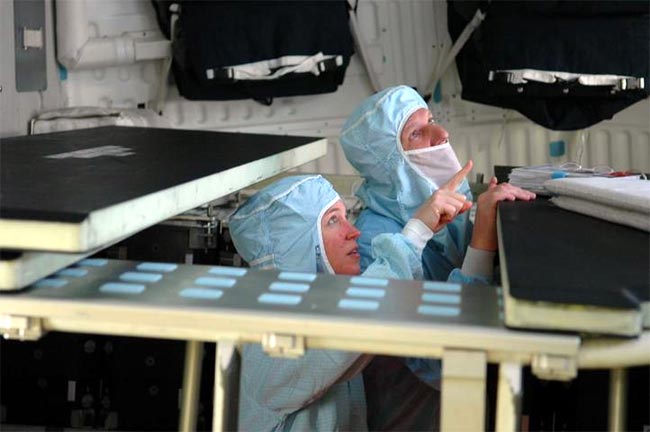Start the Clock: NASA’s Countdown Begins for Space Shuttle Launch

CAPE CANAVERAL, Fla. - The clock is ticking for NASA's space shuttle Discovery and its seven-astronaut crew as the countdown for their 12-day spaceflight began Wednesday.
"Everything is looking go," said veteran shuttle astronaut Steven Lindsey, commander of Discovery's STS-121 mission, this week. "Weather permitting, we're going to be airborne on July 1."
The countdown for Discovery's STS-121 shuttle mission began at 5:00 p.m. EDT (2100 GMT) here at NASA's Kennedy Space Center (KSC) spaceport as the agency gears up for its second orbiter test flight since the 2003 Columbia accident.
"It is ready to launch," NASA test director Jeff Spaulding said of Discovery during a status report today. "I think people have done a great job getting this vehicle ready."
Discovery's STS-121 spaceflight is set to launch toward the International Space Station (ISS) from Pad 39B at 3:48:37 p.m. EDT (1948:37 GMT) on July 1. Current forecasts call for a 60 percent chance of poor weather on launch day, NASA said.
"I'm hoping the weather is going to improve so we'll get off on time," said Piers Sellers, STS-121 mission specialist and spacewalker, after arriving at KSC Tuesday with his fellow crewmates.
The astronauts were scheduled to perform a series of training flights aboard NASA aircraft today as they spend their final days on Earth before rocketing toward the ISS.
Breaking space news, the latest updates on rocket launches, skywatching events and more!
"They're as excited as we are to get back to flying," Spaulding said of the Discovery astronauts.
A vital mission
NASA's STS-121 mission is the agency's final test flight before construction resumes on the ISS. The spaceflight will test additional external tank safety modifications, shuttle inspection and repair techniques, and ferry more than two tons of supplies to the space station.
The mission will also make critical repairs required to build the space station, and will return the orbital laboratory back to a permanent three-astronaut population. ISS crews have been limited to two astronauts since the Columbia accident.
Discovery's planned spaceflight follows NASA's STS-114 return to flight mission, which launched in July 2005 after more than two years of recovery efforts aimed at enhancing shuttle safety.
Since that last spaceflight, NASA engineers have made additional modifications to reduce launch debris hazards posed by external tank foam insulation. Foam debris led to the 2003 loss of Columbia and its astronaut crew, and was also seen during the STS-114 launch but did not strike the Discovery orbiter.
"I think the team has been excited and kind of anxious to get into the launch countdown," Spaulding said.
NASA estimates that it will spend about $1.2 billion on its return to flight efforts by the end of the 2006 fiscal year, according to a recent shuttle program report.
Counting down to launch
Over the next few days, pad workers will test Discovery's avionics and load the cryogenic liquid oxygen and liquid hydrogen used to power the spacecraft during flight.
That fuel loading task is set to begin at 2:30 p.m. (1830 GMT) Thursday and last about eight hours, Spaulding said.
Additional checks of Discovery's systems will be performed on Friday, when payload specialists will pack the final cargo items inside the orbiter's middeck, NASA officials added.
"Our teams have been working tirelessly this past year to help make this shuttle flight, and all of our shuttle flights, as safe as possible for the crews," Spaulding said, adding that he's especially excited with the upcoming July 4th holiday. "As we approach our nation's 230th birthday, I'm proud to announce that the launch vehicle and the launch and flight crews are ready to [fly] and continue our mission of completing the space station."
- Meet the STS-121 Crew: The Flyers
- Meet the STS-121 Crew: The Spacewalkers
- Return to Flight: NASA's Road to STS-121
- Great Space Quiz: Space Shuttle Countdown
- Great Space Quiz: Life in Orbit

Tariq is the award-winning Editor-in-Chief of Space.com and joined the team in 2001. He covers human spaceflight, as well as skywatching and entertainment. He became Space.com's Editor-in-Chief in 2019. Before joining Space.com, Tariq was a staff reporter for The Los Angeles Times covering education and city beats in La Habra, Fullerton and Huntington Beach. He's a recipient of the 2022 Harry Kolcum Award for excellence in space reporting and the 2025 Space Pioneer Award from the National Space Society. He is an Eagle Scout and Space Camp alum with journalism degrees from the USC and NYU. You can find Tariq at Space.com and as the co-host to the This Week In Space podcast on the TWiT network. To see his latest project, you can follow Tariq on Twitter @tariqjmalik.
